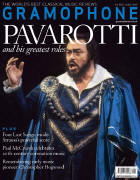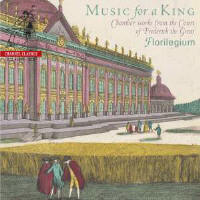Texte paru dans: / Appeared in: |
|
|
Outil de traduction (Très approximatif) |
|
|
Reviewer:
Charlotte Gardner This latest from Florilegium is such a musicological feast that it had three-quarters won me over before I even pressed ‘play’. It is a wide-ranging two-disc celebration of Frederick the Great’s talents as a connoisseur of music and talent-spotter of luminary-calibre musicians, taking in names such as Johann Gottfried Müthel and Franz Benda alongside the expected likes of CPE Bach and Johann Joachim Quantz. Harpsichordist Terence Charlston opens the programme alone with the three-part fugue from JS Bach’s Musical Offering in a flowing reading carrying a satisfying impression of grandeur and cathedral-like architecture. Next to be honoured is Frederick’s flute teacher Quantz, by means of a trio sonata probably written during his pre-Berlin Dresden years. Here it comes silken and rapport-filled, Charlston joined by flautist Florilegium founder Ashley Solomon, violinist Bojan Čičić and viola da gambist Reiko Ichise, with nicely weighted engineering allowing everyone to shine. A Graun double-bill then acts as cellist Jennifer Morsches’s entry cue, with a nimbly graceful reading of Carl Heinrich Graun’s cello sonata followed by an unusual quintet from his older brother Johann Gottlieb Graun, where some of the most characterful moments come via its leaping cello flourishes. It’s the second disc where things get especially interesting, though. Take the sweetness and fluidity with which Čičić brings off the sonata by Benda, the violinist-composer who Frederick engaged after hearing him practising through an open window. Or listen to the only flute sonata written by Müthel, who is interesting for being a composer who refused to compose on demand but only at the call of his inner muse, and whose musical style was described by an admiring Charles Burney as ‘full of novelty, taste, grace and contrivance … the passages are entirely his own’. Solomon’s reading is beautifully rhapsodic. Unusually, it appears here with clavichord accompaniment in recognition of Müthel’s preference for this instrument over the more usual harpsichord; and the wonderfully free, improvisational quality Julian Perkins brings to his duetting with Solomon makes this one of the album’s highlights. We also have Perkins to thank for another of the disc’s standout works, this one a set of clavichord variations by the equally fascinating figure of Carl Friedrich Fasch. Primarily a champion of others (founder of the Berlin Singakademie and arranger of the Berlin premiere of Mozart’s Requiem for his own funeral), Fasch was a self-critical personality who was reluctant for his own works to be performed in public. But while these sunnily lilting variations are hardly a masterpiece, they allow both the clavichord and its player to show their capabilities, and Perkins explores his instrument’s full gamut of colours and personalities. There is also something rather fun about the perfect, low-key climax to this array of intimate chamber treasures being courtesy of court maverick CPE Bach. His delicate G major Duet for flute and violin is one of only two known surviving duets of his, and Solomon and Čičić bring it off as an alertly intelligent and sensitive conversation. |
|




